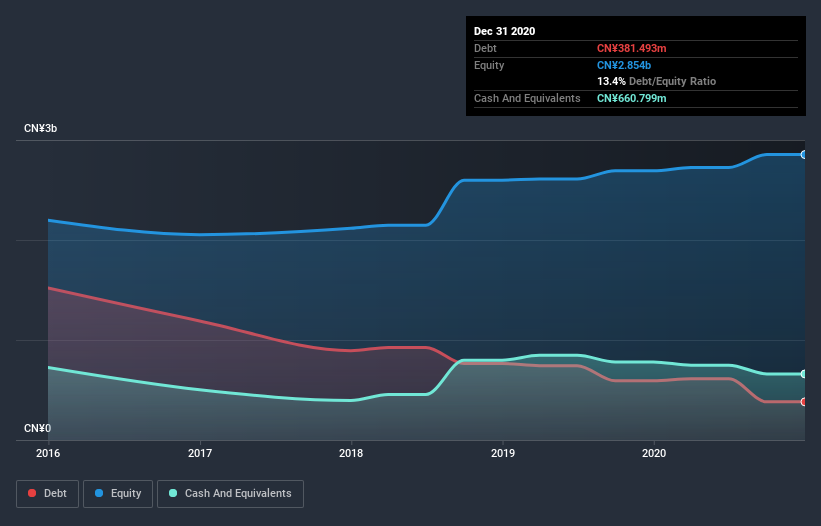- Hong Kong
- /
- Electric Utilities
- /
- SEHK:1713
Does Sichuan Energy Investment Development (HKG:1713) Have A Healthy Balance Sheet?
Warren Buffett famously said, 'Volatility is far from synonymous with risk.' It's only natural to consider a company's balance sheet when you examine how risky it is, since debt is often involved when a business collapses. We note that Sichuan Energy Investment Development Co., Ltd. (HKG:1713) does have debt on its balance sheet. But is this debt a concern to shareholders?
When Is Debt Dangerous?
Debt and other liabilities become risky for a business when it cannot easily fulfill those obligations, either with free cash flow or by raising capital at an attractive price. Part and parcel of capitalism is the process of 'creative destruction' where failed businesses are mercilessly liquidated by their bankers. While that is not too common, we often do see indebted companies permanently diluting shareholders because lenders force them to raise capital at a distressed price. By replacing dilution, though, debt can be an extremely good tool for businesses that need capital to invest in growth at high rates of return. When we think about a company's use of debt, we first look at cash and debt together.
Check out our latest analysis for Sichuan Energy Investment Development
What Is Sichuan Energy Investment Development's Net Debt?
You can click the graphic below for the historical numbers, but it shows that Sichuan Energy Investment Development had CN¥381.5m of debt in December 2020, down from CN¥591.8m, one year before. But on the other hand it also has CN¥660.8m in cash, leading to a CN¥279.3m net cash position.

How Strong Is Sichuan Energy Investment Development's Balance Sheet?
The latest balance sheet data shows that Sichuan Energy Investment Development had liabilities of CN¥1.47b due within a year, and liabilities of CN¥164.7m falling due after that. Offsetting this, it had CN¥660.8m in cash and CN¥443.0m in receivables that were due within 12 months. So it has liabilities totalling CN¥533.4m more than its cash and near-term receivables, combined.
Sichuan Energy Investment Development has a market capitalization of CN¥1.48b, so it could very likely raise cash to ameliorate its balance sheet, if the need arose. But it's clear that we should definitely closely examine whether it can manage its debt without dilution. While it does have liabilities worth noting, Sichuan Energy Investment Development also has more cash than debt, so we're pretty confident it can manage its debt safely.
On top of that, Sichuan Energy Investment Development grew its EBIT by 31% over the last twelve months, and that growth will make it easier to handle its debt. There's no doubt that we learn most about debt from the balance sheet. But you can't view debt in total isolation; since Sichuan Energy Investment Development will need earnings to service that debt. So when considering debt, it's definitely worth looking at the earnings trend. Click here for an interactive snapshot.
But our final consideration is also important, because a company cannot pay debt with paper profits; it needs cold hard cash. While Sichuan Energy Investment Development has net cash on its balance sheet, it's still worth taking a look at its ability to convert earnings before interest and tax (EBIT) to free cash flow, to help us understand how quickly it is building (or eroding) that cash balance. During the last three years, Sichuan Energy Investment Development produced sturdy free cash flow equating to 62% of its EBIT, about what we'd expect. This cold hard cash means it can reduce its debt when it wants to.
Summing up
Although Sichuan Energy Investment Development's balance sheet isn't particularly strong, due to the total liabilities, it is clearly positive to see that it has net cash of CN¥279.3m. And it impressed us with its EBIT growth of 31% over the last year. So we don't think Sichuan Energy Investment Development's use of debt is risky. There's no doubt that we learn most about debt from the balance sheet. But ultimately, every company can contain risks that exist outside of the balance sheet. For instance, we've identified 2 warning signs for Sichuan Energy Investment Development that you should be aware of.
At the end of the day, it's often better to focus on companies that are free from net debt. You can access our special list of such companies (all with a track record of profit growth). It's free.
If you’re looking to trade Sichuan Energy Investment Development, open an account with the lowest-cost* platform trusted by professionals, Interactive Brokers. Their clients from over 200 countries and territories trade stocks, options, futures, forex, bonds and funds worldwide from a single integrated account. Promoted
New: Manage All Your Stock Portfolios in One Place
We've created the ultimate portfolio companion for stock investors, and it's free.
• Connect an unlimited number of Portfolios and see your total in one currency
• Be alerted to new Warning Signs or Risks via email or mobile
• Track the Fair Value of your stocks
This article by Simply Wall St is general in nature. It does not constitute a recommendation to buy or sell any stock, and does not take account of your objectives, or your financial situation. We aim to bring you long-term focused analysis driven by fundamental data. Note that our analysis may not factor in the latest price-sensitive company announcements or qualitative material. Simply Wall St has no position in any stocks mentioned.
*Interactive Brokers Rated Lowest Cost Broker by StockBrokers.com Annual Online Review 2020
Have feedback on this article? Concerned about the content? Get in touch with us directly. Alternatively, email editorial-team (at) simplywallst.com.
About SEHK:1713
Sichuan Energy Investment Development
A vertically integrated power supplier and service provider primarily in Mainland China.
Good value with proven track record.
Market Insights
Community Narratives



